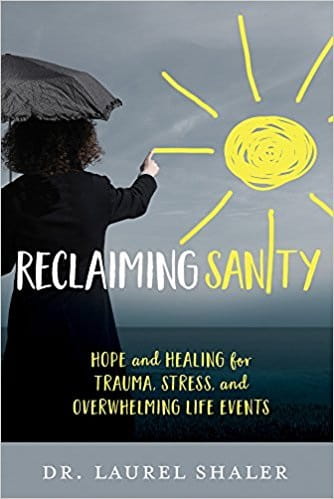How to Reclaim Your Sanity from Trauma

The Trauma Quiz
Part I
Y N Have you survived a natural disaster (flood, hurricane, tornado, etc.)?
Y N Have you been in a car accident or house fire?
Y N Have you witnessed something really bad happen to someone else?
Y N Has someone in your life died suddenly, unnaturally, or untimely?
Y N Has someone assaulted or abused you emotionally, physically, or sexually?
Y N Have you been bullied or betrayed?
Y N Has anything bad happened in your life that still bothers you?
Part II
Y N Do you have emotions you can’t explain?
Y N Do you get angry or frustrated for unknown reasons?
Y N Do you feel like you’re going crazy?
Y N Are you having upsetting thoughts related to a negative experience?
Y N Are you involved in behaviors that started after a negative event that are out of the ordinary for you?
Y N Are you sick and tired of feeling emotionally down all the time?
Note: is quiz is not intended to take the place of testing conducted by a mental health professional, nor is it intended to be used as a diagnostic instrument.
Results
If you answered yes to at least one question in part I and yes to at least one question in part II of the Trauma Quiz, you may be living in the aftermath of a traumatic life event. More importantly, if you answered yes to any of these questions, you have survived! Survival is not a place to remain, however. Surviving is a necessary step in healing, but it is not fully living. Remember that there is hope for living fully, and the next steps to healing are offered within these pages.
What Is Stress?
You’ve probably heard the word stress used to describe many different scenarios. In fact, you’ve probably been “stressed out” more times than you can count. Merriam-Webster’s de nes stress simply as “a state of mental tension and worry caused by problems in your life.”3 But did you know there are two major types of stress? ere’s good stress, eustress, and there’s bad stress, distress.
Eustress (pronounced “u-stress”) is what you experience when a positive disruption happens in your life that, even though it is “good,” is difficult to cope with emotionally. Some life situations that may lead to eustress include having a baby, graduating from high school, starting college, buying your first home, receiving a job promotion, getting married—and the list goes on! Researchers from Brock University say eustress can help people be “motivated, challenged, and productive.”4
Distress, on the other hand, includes those all-too-frequent negative, upsetting feelings that accompany the bad stuff going on. Whereas eustress can foster needed energy and hope, distress takes hold when people don’t see any resolution or end in sight. As a result, the individual may undergo problematic physical and behavioral symptoms such as high blood pressure, tension, changes in appetite, and more. It is possible to feel distress over a positive life situation too, if one gets to the point of having di culty han- dling all of the resulting changes, responsibilities, etc., but distress is more often experienced as a result of negative occurrences. e sudden or ongoing stressful encounters you’ve had may still be a ecting you today. Stress can make you feel overwhelmed. Read on to learn more about that.
What Is an Overwhelming Life Event?
“I’m so overwhelmed!” I exclaimed to my husband. We were buy- ing a house, I was struggling through a disagreement with a dear friend, and I had tons of work to do. Can you relate? You have so much going on in life that you almost don’t know where to begin. You wonder how or if you’ll get things under control. You may feel anxious or close to panic—as if hiding under your work desk would make the whole world disappear, at least for a little while.
You wake up with a sinking feeling and can’t figure out why, until suddenly you’re reminded of a past or present event, or series of events, that engulfs you with powerful emotion. When overwhelmed, you feel plagued with chaotic thoughts, memories, and feelings. Your anxiety may rise to the point that you want to escape entirely because you believe it’s all too much. At a minimum, you don’t want to face a mountain of demands. Perhaps you don’t know how to face them.
If you experienced a combination of life events that left you feeling trounced, the initial anxiety or excessive worry you felt during the original experience may remain. Feeling overwhelmed is similar to having chronic flashbacks—that experience of reliving the negative event—wherein you don’t know how to channel or cope with the onslaught of emotion.
Say you’ve had a rough day. You got the kids to school late because of a fender bender, your boss gives you “one more chance” to improve your work, and a notice arrives in the mail saying that your bank account is overdrawn. When you realize you burned the gourmet pizza (okay, frozen pizza), you start to cry. You’ve had a life pileup. Hubby starts questioning why you would cry over burned pizza, and you realize it’s not about the pizza at all. It’s about everything else that took place that day. e stress is cumulative and distressing. Stress can make you feel overwhelmed, as can other emotions, such as anger, anxiety, and depression. We will explore these in more detail later in the book.
Good News! You’re Not Crazy
By understanding the difference between trauma, stress, and over- whelming life events, you can begin recognizing and accepting that something legitimately bad has taken place and that your problematic thoughts, feelings, or behaviors are the real and expected results. is is not about excuse making or justifying wrongdoings; it is merely the first step in choosing to be healed from your past and facing the future in a better place physically, emotionally, and spiritually. It’s real. You have suffered, but you are also being restored. You are getting stronger—not by yourself, but with Christ, who is your strength, and with a community of people who love and care for you. The good news is: you are not crazy, even when you may feel like it. The better news is:
Answers are on the way.
Healing has begun.
You are alive.
You are loved.
You are not crazy.
You can reclaim sanity.

Laurel Shaler, PhD, is a professor at Liberty University and a speaker on faith and emotional well-being. A national certified counselor and social worker, Dr. Shaler is a former psychotherapist for the Department of Veterans Affairs, where she specialized in treating trauma. She and her family live in Greenville, South Carolina.
Image courtesy: ©Thinkstock/phive2015
Publication date: June 2, 2017
Originally published June 02, 2017.




